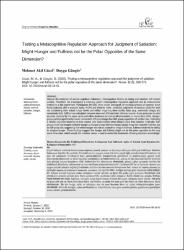Testing a Metacognitive Regulation Approach for Judgment of Satiation: Might Hunger and Fullness not be the Polar Opposites of the Same Dimension?
Abstract
Despite the existence of several cognitive influences, metacognitive factors on eating and satiation still remain unclear. Therefore, we investigated a relatively recent metacognitive regulation approach and its measurement method in a lab-experiment.Participants (N=216) were shownphotografsof varying portions of common lunch foods (selected after a separate study, N=94) and asked to makepredicted judgmentsof satiation (JOS) for each via considering their actual hunger levels and whilst imagining other bodily states (e.g., extremely hungry and completely full). Differencescalculated between observed-JOS and their reference scores -thosepresumed to yield accurate matches for the cases-produced either deviances or none at all (discordant-or concordant-JOS). Hungry-group yielded significantly lower concordant-JOS percentage than full-group regardless of portion size, indicating a clearercognitive tendency to lose control over consumption when being hungry than satiated. Critically, full-group could notimagine extreme hunger as hungry-group whereas hungry-group imagined complete fullness just as full-group did, suggesting that whilst hunger was not an obstacle to imagine fullness,fullness hindered the ability to imagine hunger. These findingssuggestthathunger and fullness mightnotbe the polar opposites on the very same dimension, which would, for instance,reveal a need to revisit the treatments of eating disorders accordingly.


















